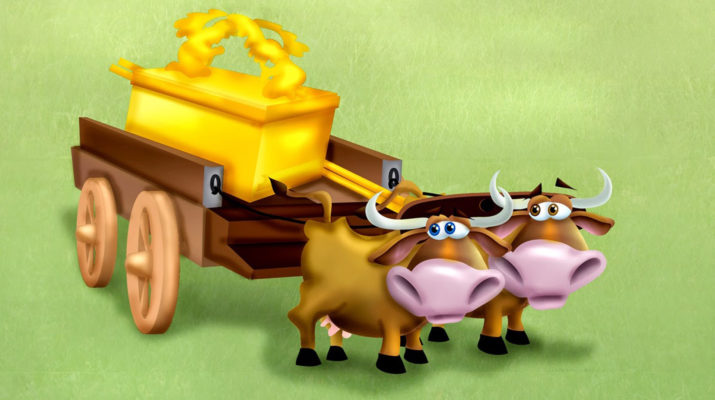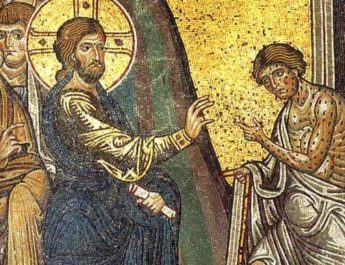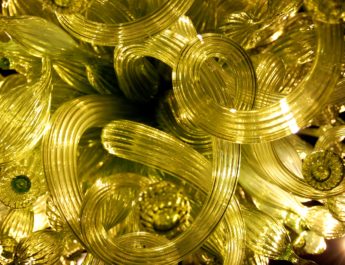2 Samuel 5:1-5 & 6:1-5
NL 207
5:1 Then allA the tribesB of IsraelC cameD to DavidE
A “all” = kol. From kalal (to complete). This is all or every.
B “tribes” = shebet. This is a rod, staff, club, scepter, dart, or tribe. Literally a stick that can be used for punishing, writing, fighting, walking, ruling; thus, used figuratively for a clan.
C “Israel” = Yisrael. From sarah (to persist, exert oneself, contend, persevere, wrestle, prevail) + El (God or god). This is Israel, meaning God strives or one who strives with God; new name for Jacob and for his offspring. This refers to the people and to the land.
D “came” = bo. This is to enter, come in, advance, fulfill, bring offerings, enter to worship, attack. It can also have a sexual connotation.
E “David” = David. From the same as dod (beloved, love, uncle); the root may mean to boil, which is used figuratively to describe love. So, this implies someone you love such as a friend, a lover, or a close family member like an uncle. David’s name likely means something like “beloved one.”
at HebronF and said, “Look,G we are your boneH and flesh.I
F “Hebron” = Chebron. From cheber (company, society, enchantment, wide); from chabar (to unite, ally, attach, touch; to join in a literal or figurative sense; also, specially, using magic knots or spells to fascinate or connect). This is Hebron, meaning “seat of association” or “league.”
G “look” = hen. This is a remark of surprise or excitement: lo! Behold! It can also mean if or though.
H “bone” = etsem. From atsam (vast, numerous, strong; to close one’s eyes, to make powerful; to break bones). This is self, life, strength, bone, or substance.
I “flesh” = basar. From basar (being a messenger, publish, carry preach; properly, this is being fresh, rosy or cheerful as one bearing news). This is flesh, the body, fat, skin, self, nakedness, humankind, or kin. It can also refer to private parts.
2 For some time,J while SaulK wasL
J “for some time” = gam + ethmol + gam + shilshom. Gam is also, moreover, again. Ethmol is 8x in OT. From et (with, among, beside, including, toward, near); {from anah (to meet, happen, approach)} + mul (front, opposite, toward); {from mul (to cut short, circumcise, blunt, destroy)}. This is formerly, before, yesterday, time. Shilshom is from shalash (to make triplicate, do a third time); from the same as shalosh (three, fork, three times). This is three days ago, before, yesterday in the past.
K “Saul” = Shaul. From shaal (to ask, inquire, beg, borrow, desire, request; can also mean demand). This is Saul or Shaul, meaning “asked of the Lord.”
L “was” = hayah. This is to be or become, to happen.
kingM over us, it was you who led outN Israel and brought it in.O
M “king” = melek. From malak (to be or become king or queen, to rise to the throne, to be crowned; by implication, to take counsel). This is king or royal.
N “led out” = yatsa. This is to go or come out, bring forth, appear. It is to go out in a literal or figurative sense.
O “brought…in” = bo. Same as “came” in v5:1. See note D above.
The LordP said to you, ‘It is you who shall be shepherdQ of my peopleR Israel, you who shall be rulerS over Israel.’”
P “Lord” = YHVH. Related to “was” in v5:2. From havah (to be, become) or hayah (see note L above). This is the name of the God of Israel, the self-existent and eternal one, the tetragrammaton. This pronunciation has been lost to time so “Lord” is generally used in its place.
Q “be shepherd” = ra’ah. This is to tend a flock, pasture, or graze. It can mean to rule or to associate with someone. Figuratively, it can be ruler or teacher.
R “people” = am. From amam (to darken, hide, associate; creating shadows by huddling together). This is people or nation. It can be used specifically for a tribe, collectively of troops or armies, or figuratively to refer to a flock of animals.
S “ruler” = nagid. From nagad (this is to declare, make conspicuous, stand in front, manifest, predict, explain). This is a commander or leader as the one who stands at the front, whether in a military, religious, or civic setting. It can also mean honorable or noble in an abstract sense.
3 So all the eldersT of Israel came to the king at Hebron, and King David madeU a covenantV with them at Hebron beforeW the Lord, and they anointedX David king over Israel.
T “elders” = zaqen. From the same as zaqan (beard or chin – the beard represents old age). This is old, aged, or elder.
U “made” = karat. This is to cut down, cut off, or make a covenant (idiom for making a covenant is “to cut a covenant”). It can also mean to destroy, fail, or consume.
V “covenant” = berit. Perhaps from barah (to eat, choose, make clear); perhaps from bar (grain, wheat); from barar (to select, purify, cleanse, test, brighten, polish). This is a compact, covenant, alliance, treaty, or league.
W “before” = paneh. From panah (to turn, face, appear). This is face in a literal or figurative sense. It could be face, presence, anger, respect. It can also be used of God to indicate divine favor or presence.
X “anointed” = mashach. This is smear, paint, spread, or paint. It can also be to rub with oil or, otherwise stated, to anoint. This implies a consecration. This root verb is where the word “messiah” comes from.
4 David was thirtyY yearsZ oldAA when he began to reign,BB and he reigned fortyCC years.
Y “thirty” = sheloshim. Related to “for some time” in v5:2. From the same as shalosh (see note J above). This is thirty or thirtieth.
Z “years” = shanah. From shana (to change, alter). This is a year, age, old. It can also mean yearly.
AA “old” = ben. From banah (to build or obtain children). This is son, age, child. It is son in a literal or figurative sense.
BB “began to reign” = malak. Related to “king” in v5:2. See note M above.
CC “forty” = arbaim. From the same as arba (four); from raba (to make square or be four-sided); perhaps from raba (to lie down flat; can be to lie for mating). This is forty.
5 At Hebron he reigned over JudahDD sevenEE years and sixFF months,GG and at JerusalemHH he reigned over all Israel and Judah thirty-threeII years.
DD “Judah” = Yehudah. Probably from yadah (to throw one’s hands into the air in a gesture of praise); from yad (hand). This is Judah, meaning “praised.”
EE “seven” = sheba. This is seven or by sevenfold. It can also be used to imply a week or an indefinite number. Symbolically, this is the number of fullness, sacredness, perfection.
FF “six” = shesh. This is six. Figuratively, it can be a surplus since it is one more than the number of fingers on the hand.
GG “months” = chodesh. From chadash (to renew, repair). This refers to a new moon. It can also mean monthly.
HH “Jerusalem” = Yerushalaim. From yarah (to throw, shoot, be stunned; to flow as water so figuratively to instruct or teach) + shalam (to make amends, to be complete or sound). This is Jerusalem, dwelling of peace.
II “three” = shalosh. Related to {untranslated} in v5:2 & “thirty” in v5:4. See note J above.
6:1 David againJJ gatheredKK all the chosenLL men of Israel, thirty thousand.MM
JJ “again” = od. From ud (to admonish, repeat, duplicate, testify, restore, record, relieve). This is still, yet, again, more.
KK “gathered” = yasaph. This is to add, increase, continue, exceed.
LL “chosen” = bachur. From bachar (to choose, appoint, try, excellent). This is choice, chosen, selected. It is a youth or young man.
MM “thousand” = eleph. Perhaps from the same as eleph (herd, cattle); from alaph (to learn, speak, associate with). This is thousand.
2 David and all the people with him set outNN and wentOO from Baale-judahPP to bring upQQ from there
NN “set out” = qum. To arise, stand, accomplish, establish, abide. This is rising as in rising against, getting up after being sick or asleep, arising from one state to another, becoming powerful, or rising for action. It can also be standing in a figurative sense.
OO “went” = halak. This is go, come, walk. It is walk literally and figuratively and includes people and animals. It can be used figuratively for one’s moral life – how we walk according to God’s way or against it. It can also refer to the walk of life as in the course one’s life takes, the choices we make, etc.
PP “Baale-judah” = Baale Yehudah. Related to “Judah” in v5:5. 1x in OT. From Baal (Baal, literally “lord,” a Phoenician god); {from the same as ba’al (lord, owner, ally, or archer); from ba’al (to marry, have dominion, be master)} + Yehudah (see note DD above). This is Baale-judah, a place meaning “Baal of Judah,” “masters of Judah,” “Lord of Judah,” or “Let the Lord be Praised.” See https://www.abarim-publications.com/Meaning/Baale-judah.html
QQ “bring up” = alah. This is to go up, approach, ascend, be high, be a priority; to arise in a literal or figurative sense.
the arkRR of God,SS which is calledTT by the nameUU of
RR “ark” = aron. Perhaps from arah (to gather or pluck). This is a chest, box, or coffin. It is used for the Ark of the Covenant.
SS “God” = Elohim. Related to “Israel” in v5:1. See note C above.
TT “called” = qara. This is to call or call out – to call someone by name. Also used more broadly for calling forth.
UU “name” = shem. May be from sum (to put, place, set). This is name, fame, renown. A name was thought to indicate something essential about a person – something about their individuality. So, this word can also mean honor, authority, or character.
the Lord of hostsVV who is enthronedWW on the cherubim.XX
VV “hosts” = tsaba. From tsaba (to wage war, serve, assemble, fight, perform, muster, wait on). This is a large group of persons (used figuratively for a group of things). It implies a campaign literally as with army, war, warfare, battle, company, soldiers. Can also be used figuratively for hardship or for worship.
WW “enthroned” = yashab. This is to sit and so to remain and so to dwell. It is sitting for any reason – as a judge, in order to ambush, or just sitting quietly. Causatively, this can mean settling or marrying. This can also mean continue, endure, or establish.
XX “cherubim” = kerub. Perhaps related to Akkadian (“to bless” or “one who blesses”). This is a cherub – perhaps a class of angels. See https://en.wiktionary.org/wiki/%D7%9B%D7%A8%D7%95%D7%91#Hebrew
3 They carriedYY the ark of God on a newZZ cartAAA and broughtBBB it
YY “carried” = rakab. This is to ride an animal or in some vehicle. It can also mean bringing on a horse.
ZZ “new” = chadash. Related to “months” in v5:5. See note GG above.
AAA “cart” = agalah. From the same as egel (male calf as one that frisks about; often one that is almost grown up); may be from the same as agol (round, circular – root meaning revolve). This is something that turns like a cart or chariot – a vehicle with wheels.
BBB “brought” = nasa. This is to lift in a broad sense, literally and figuratively. So it could be to carry, take, or arise. It could also be bring forth, advance, accept.
out of the houseCCC of Abinadab,DDD which was on the hill.EEE
CCC “house” = bayit. Related to “old” in v5:4. Probably from banah (see note AA above). This is house, court, family, palace, temple.
DDD “Abinadab” = Abinadab. 12x in OT. From ab (father literal or figurative) + nadab (to offer voluntarily, incite, impel; to volunteer to be a soldier or offer freely). This is Abinadab, meaning “my father is noble” or “father of generosity,” which is to say very generous.
EEE “hill” = gibah. From the same as Geba (Geba or Gibeah; hillock); from the same as gabia (cup, bowl, flower; root might mean being convex). This is hill or little hill.
UzzahFFF and Ahio,GGG the sonsHHH of Abinadab, were drivingIII the new cart
FFF “Uzzah” = Uzza. 14x in OT. From azaz (to be strong in a literal or figurative sense, overcome, be impudent). This is Uzzah or Uzza, a name meaning “strength.”
GGG “Ahio” = Achyo. 6x in OT. From the same as ach (brother, kindred, another, other, like) OR from ach (see above) + Yah (the shortened form of the name of the God of Israel; God, Lord); {from YHVH (proper name of the God of Israel; God, Lord; the self-existent or eternal one); from havah (to become) or hayah (to be, become, happen)}} This is Ahio, a name meaning “brotherly” or “Brother of the Lord.” See https://www.abarim-publications.com/Meaning/Ahio.html
HHH “sons” = ben. Same as “old” in v54. See note AA above.
III “driving” = nahag. This is to drive as in driving flocks, but also driving in animal or vehicle like a chariot. It can mean to carry away, lead, drive away, proceed, or guide. It can also relate to behavior and what one is accustomed to.
4 JJJwith the ark of God, and Ahio went in front ofKKK the ark. 5 David and all the house of Israel were dancingLLL before the Lord with all their might,MMM
JJJ Some manuscripts add “and they brought it out of the house of Abinadab that was on the hill” = nasa + bayit + Abinadab + asher + gibah. Nasa is the same as “brought” in v6:3. See note BBB above. Bayit is the same as “house” in v6:3. See note CCC above. Gibah is the same as “hill” in v6:3. See note EEE above.
KKK “in front of” = paneh. Same as “before” in v5:3. See note W above.
LLL “dancing” = sachaq. This is to laugh, celebrate, joke, mock, scorn. This is laughing, whether for joy or scorn. It can imply plays or holding a contest.
MMM “might” = ets. Perhaps from atsah (to shut, fasten, firm up, to close one’s eyes). This is tree or other things related to trees like wood, sticks, or stalks. It can also refer to wood products like a plank or staff or gallows. Additionally, this can refer to a carpenter.
with songsNNN and lyresOOO and harpsPPP
NNN “songs” = berosh. This is a cypress, fir, or juniper. It can be something made of this wood like a lance of musical instrument.
OOO “lyres” = kinnor. Root may be to twang. This is a lyre or harp.
PPP “harps” = nebel. From nabel (to fall away, faint, wither, languish, sink; figuratively, being senseless, foolish, or wicked; to despise, disgrace, or fall to nothing, to be seen with contempt). This is a vessel, perhaps made of skins for holding liquids. It could be a skin, vase, or lyre as having a similar shape.
and tambourinesQQQ and castanetsRRR and cymbals.SSS
QQQ “tambourines” = toph. 17x in OT. Perhaps from taphaph (to play a drum, timbrel, or tambourine). This is a timbrel or tambourine.
RRR “castanets” = menaanea. 1x in OT. From nua (to waver in a literal or figurative sense; to tremble, quiver, totter; a fugitive). This is some kind of instrument that rattles – perhaps a castanet or sistrum.
SSS “cymbals” = tsaltsal. 6x in OT. From tsalal (to tingle or rattle; can express shame or fear). This is something that clatters, whirrs, or buzzes. So, it could be a cricket or locust, a harpoon for the sound it makes or a cymbal as it sounds.
Image credit: “The Ark is Captured” by Jack Foster (Mr BibleHead).




